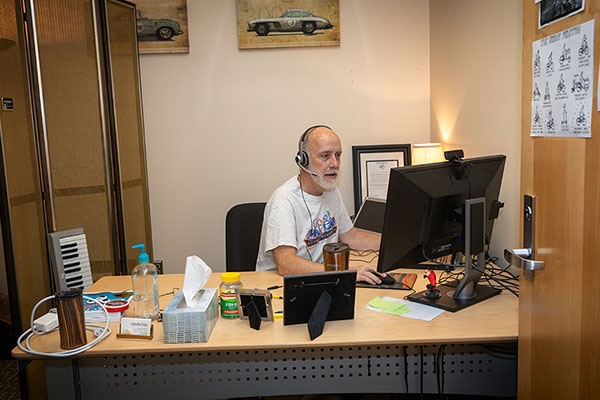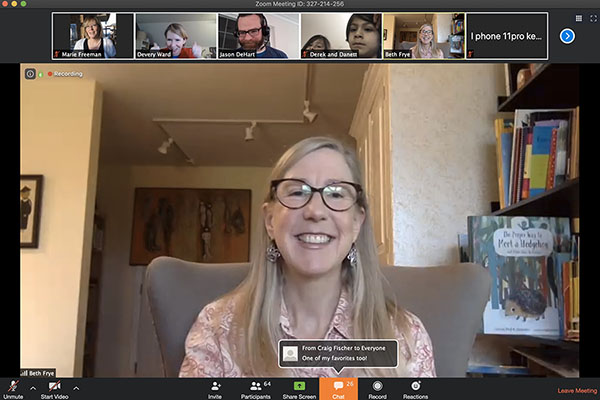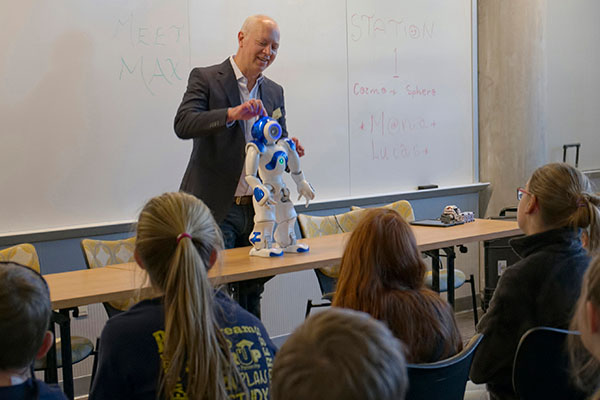BOONE, N.C. — As colleges and universities across the country prepare for some degree of combination of remote, online and face-to-face learning this fall, the Reich College of Education’s (RCOE) faculty experts weigh in on the advantages and challenges of online teaching and learning. Herein is their advice about what works — and what doesn’t — when engaging students in virtual learning spaces.
“We are lucky at Appalachian to have a number of people who are committed to, experienced in and passionate about quality online learning,” said Dr. Amy Cheney, interim chair and professor of instructional technology in Appalachian’s Department of Leadership and Educational Studies (LES). “The LES department has an award-winning online program that dates back 15 years, and we will continue providing even broader exceptional teaching and learning experiences online.”
Rethinking spaces for flexible online learning
Some of the advantages of online learning noted by Cheney and her colleagues include the following:
- The ability to create communities of learners who might not otherwise interact.
- Flexibility in scheduling.
- Variety of activities available.
- Opportunities to embrace learner choice.
- Accommodating different modes of interacting with others and content.
In this new learning and teaching environment, RCOE faculty experts encourage their peers across the university to employ consistent communication, intentional organization and creativity for effective and engaging online teaching.
Dr. Paul Wallace, professor of instructional technology in the LES department, said online courses can be “more inclusive to students who might feel intimidated or anxious in a face-to-face class ... though some students find it hard to concentrate and continue in online courses.”
A well-organized environment and regular communication with instructors related to ongoing class activities is essential, he added.
Dr. Damiana Pyles, who recently published a book on digital literacy, is an associate professor of media studies in the Department of Curriculum and Instruction (CI). She said moving a face-to-face class to online without modifications can create struggle and frustration for both the instructor and the learner.
“Faculty need to rethink all the aspects of their courses to help their students to learn in online spaces,” she said. “The advantages are that students can learn in new ways, but faculty have to rethink how to set up that learning.”
Dr. Theresa Redmond, an associate professor of media studies in the CI department, encourages instructors to focus on students, explaining, “Technology doesn’t improve learning, teachers do. As classrooms pivot from the familiarity of face-to-face learning to the uncertainties and complexities of emergency remote teaching, it is essential that we reframe educational practice in creativity and student experience.”
Students in the Media Literacy class taught by Dr. Theresa Redmond, associate professor of media studies in the Department of Curriculum and Instruction, studied data mining, algorithms, data personalization and surveillance during the university’s pivot to online instruction during COVID-19. They expressed their opinions on these subjects in images such as the two shown here, called “Privacy in the Digital Age Pop Art Perspectives,” which were created in the style of pop artist Roy Lichtenstein. Each image depicts a woman bemoaning issues related to online use, including the increasing need to read the terms and conditions for apps, software and other online services in their entirety and the inescapability of one’s digital past. Images courtesy of Dr. Theresa Redmond
Online teaching — communication, organization and creativity
“Intentional online teaching will lead to successful online learning,” said Dr. Stacey Garrett, assistant professor of higher education in the LES department. “Folks must be willing to evolve and adapt in order to succeed as instructors and learners.”
Garrett encourages faculty to utilize learning management systems, such as Appalachian’s AsULearn, in order to structure their courses and maintain communication. The LES department has created an online resource, which includes information on communication, organization, engagement and assessment.
Pyles advised, “Allow more time for all assignments, but be consistent with deadlines — for example, making assignments due on Mondays in the semester — and also with technologies, such as sticking with one tool for discussions and one tool for assignments.”
Dr. Tempestt Adams, assistant professor of career and technical education in the CI department, concurred. “As an instructor,” she said, “I know that my students lead equally busy and complicated lives so I want to be sure they are able to manage their studies on their own terms —put yourself in the shoes of your students, model expectations.”
Dr. Susan Hedges, assistant professor of special education in the Department of Reading Education and Special Education, emphasized that giving frequent and meaningful feedback to students is critical. “It enhances your presence in the course as the instructor and motivates students to stay engaged,” Hedges said.
“Discipline is key for the student, and creativity is key for the instructor,” said Dr. Jennifer Luetkemeyer, assistant professor of library science in the LES department. “Understanding applicable technology and multimedia is essential to teach today’s population of students.”
“We should be armed with the tools to teach students how to be responsible in their technology use and that necessitates integrating online technology into our educational approaches,” she added.
What do you think?
Share your feedback on this story.
About the Reich College of Education
Appalachian State University offers one of the largest undergraduate teacher preparation programs in North Carolina, graduating about 500 teachers a year. The Reich College of Education enrolls more than 2,000 students in its bachelor’s, master’s, education specialist and doctoral degree programs, with offerings that span multiple fields — from teacher preparation, counseling, and therapy, to higher education, school and student affairs administration, library science, educational leadership and more. With over 10,000 alumni employed in North Carolina public schools, there is at least one Reich College graduate in every county in the state. Learn more at https://rcoe.appstate.edu.
About Appalachian State University
As a premier public institution, Appalachian State University prepares students to lead purposeful lives. App State is one of 17 campuses in the University of North Carolina System, with a national reputation for innovative teaching and opening access to a high-quality, cost-effective education. The university enrolls more than 21,000 students, has a low student-to-faculty ratio and offers more than 150 undergraduate and 80 graduate majors at its Boone and Hickory campuses and through App State Online. Learn more at https://www.appstate.edu.








![How NCInnovation Is Rethinking Economic Development in North Carolina [faculty featured]](/_images/_posts/2026/02/rethinking-economic-development-600x400.jpg)








